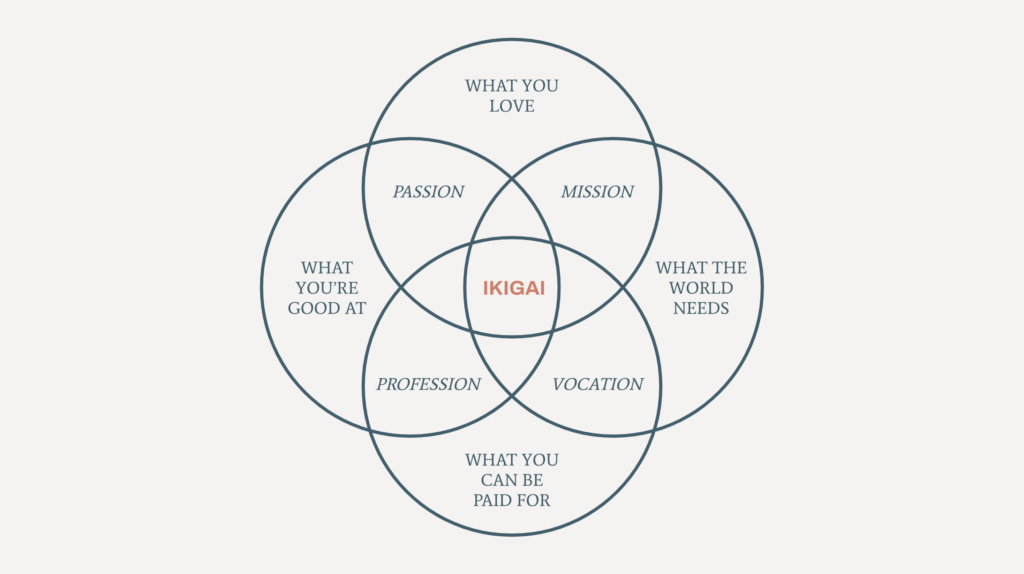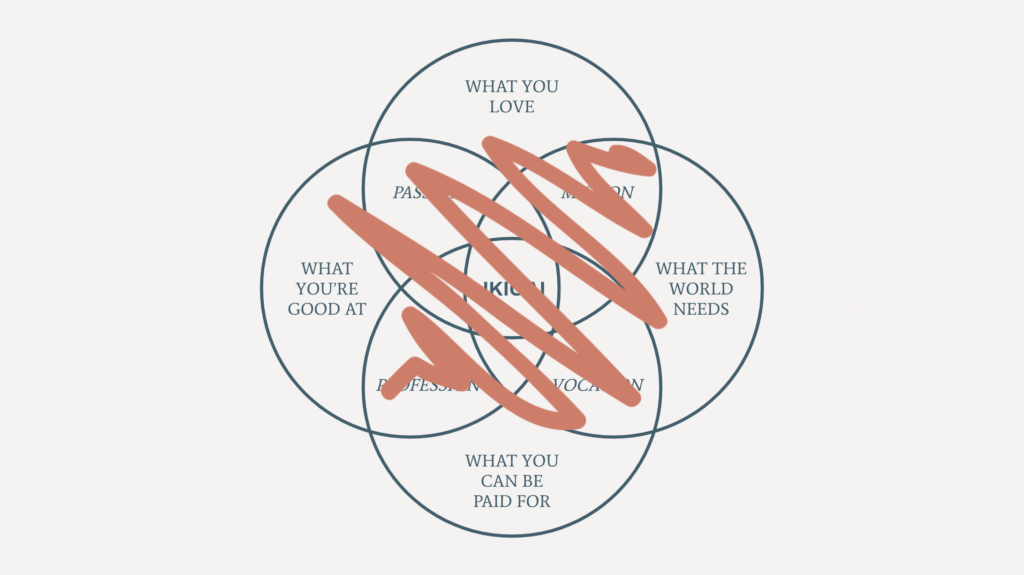I lived in Japan for seven months when I was younger. For all of the challenges I faced there as a woman and a foreigner, I still learned a lot from Japanese culture.
Because Japan experienced a long period of relative isolation from the outside world — caused by sakoku (literally “closed country”), the isolationist foreign policy of the military government during the Edo period — Japanese people have developed their own unique set of values and beliefs.
One unique Japanese concept is the idea of ikigai, which can be roughly translated to reason for being (or “raison d’être” in my native French) . Each person’s ikigai is personal to them, reflective of their inner self, and creating a mental state in which they feel at ease.
What makes it such a powerful idea in today’s age of constant change and uncertainty is that ikigai doesn’t limit someone’s value in life to career and financial status. In fact, in a survey of 2,000 Japanese people conducted by Central Research Services, only a third of respondents considered work as their ikigai.
Rather, ikigai is about feeling your life makes a difference in people’s lives — the idea that you can contribute to other people’s lives simply by living a fulfilling life. And this idea can unlock many benefits.
The Health Benefits of Ikigai
Because your ikigai is less of a theory and more of a way of living, it can have a profound impact on your mental and physical health.
- Ikigai reduces anxiety. Research shows that the feeling of ikigai contributes to a well-balanced secretion of neurotransmitters such as serotonin, dopamine, and endorphins, which in turn reduces the feeling of stress.
- Ikigai is good for your heart. A seven-year long study with more than 40,000 Japanese adults found evidence that people with a low sense of ikigai had a higher overall mortality risk, mostly due to higher cardiovascular disease.
- Ikigai increases your self-authorship. Research suggests that people without ikigai have a strong need for approval from others, while those with ikigai tend to perform tasks for their own satisfaction.
- Ikigai makes you more resilient. There’s evidence that ikigai may help you go through times of hardship more easily, making you feel like it’s worthwhile to continue living. For example, it helped many Japanese people cope during the earthquake that occurred in Japan in March 2011 and during the COVID-19 pandemic.
- Ikigai helps you live longer. Another study identified ikigai as a positive psychological factor contributing to longevity, with men and women with a sense of ikigai showing decreased risks of mortality from all causes.
In short, there’s quite a bit of research suggesting that a sense of ikigai will contribute to your overall well-being. So, how can you leverage the power of ikigai?
Leverage the Actual Power of Ikigai
The concept of ikigai has often been misunderstood in the Western world largely due to the popularity of the below Venn diagram:

This diagram was created in 2011 by astrologer Andres Zuzunaga, who designed it to help people find their purpose in life, and was then adapted by blogger Marc Winn, who replaced the word “purpose” with “ikigai” (you can read the whole story here).
However, the concept of ikigai is not about finding the intersection of what you love, what you’re good at, what the world needs, and what you can get paid for. It’s just about finding pleasure in life and being happy to get up in the morning.
“Japanese people don’t view ikigai as a lofty goal, a destination, or something to achieve,” explains Nicholas Kemp, author of the book Ikigai-Kan. Similarly, in The Little Book of Ikigai, Ken Mogi wrote: “Japanese do not need grandiose motivational frameworks to keep going, but rely more on the little rituals in their daily routines.”

Your ikigai can be found in small daily rituals, side projects, and deep conversations. It can be found in moments of silence and idleness, or in moments of creative flow. To find your ikigai, forget about the westernized version and instead follow these principles:
- Stop seeking your One True Passion. Many of us think that finding our passion will magically give our life a purpose. Instead, find meaning in your daily experiences and interactions. Explore the world around and inside you. Learn something new everyday, including about yourself. Play with uncertainty instead of chasing the next milestone.
- Embrace lifelong learning. The concept of ikigai never mentions being good at what you do. There is joy in being a beginner all over again, learning through mistakes, and growing outside of your comfort zone. Don’t try to be the expert in the room. Keep asking questions. Never stop learning.
- Let go of lofty financial goals. Ikigai also doesn’t have anything to do with money. Of course, we all need enough money to live a comfortable life, and money can help explore projects and ideas that bring you pleasure in life, but beyond the point of comfort, financial success should be seen as a potential byproduct of living a meaningful life.
- Don’t try to save the world. Instead, focus on the positive impact you can have on your friends, family, colleagues, and community. Ask yourself how you can connect with people in meaningful ways and which changes you want to bring to life. This is how we save the world — when everyone contributes at their own human scale.
As psychiatrist Mieko Kamiya puts it, ikigai is closer in Japanese to the “power necessary to live in this world” or the “happiness to be alive”, which unfortunately is often translated to “a life worth living” in English, when the original concept doesn’t ascribe measurable value to our lives.
Instead of pursuing a grand life purpose, optimize for wanting to wake up in the morning. Live a life of curiosity and connection. Trust that success will be a byproduct of the meaning you find in daily experiences.
